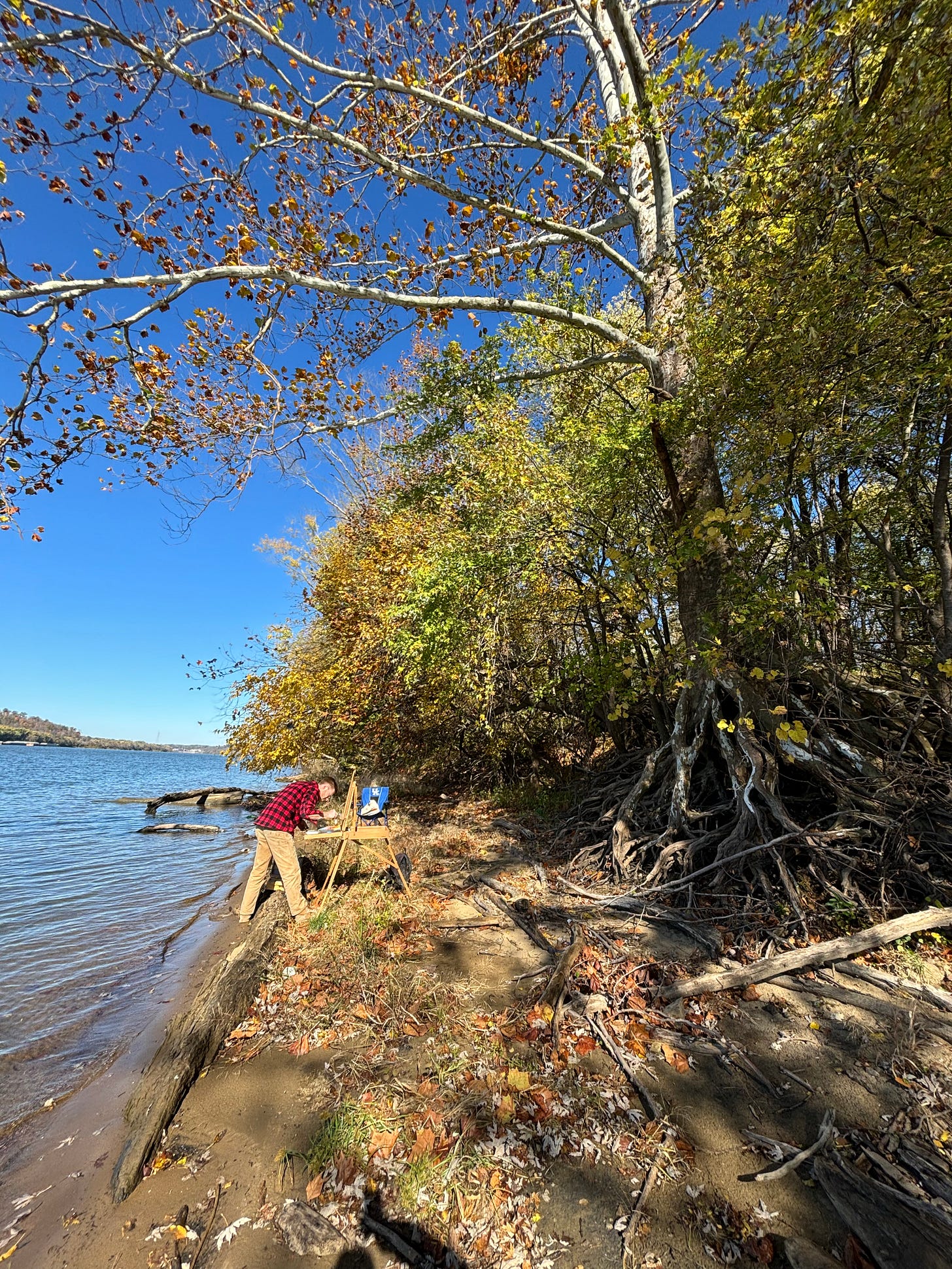Fernbank Park, Cincinnati / November 1, 2024
I almost stayed home, but Brad said I’d like it here. He was right: the woods are filled with birds—robins and downy woodpeckers—the sun’s on my face and water is lapping against the shore.
It’s nice to be by the Ohio River in wild places like this—I’m so often seeing it from bridges or concrete banks in the city. Even with the barges across the water, the garbage in the piles of driftwood, and the stone structures of an old lock—strange concrete ramps in the woods covered by undergrowth and graffiti—it’s quieter here. The river is wide and the old sycamore branches hang way out, so light dapples and dances on their white streaked roots.
Every so often we hear a train whistle from the tracks up the bank. It’s hard to tell which side of the river it’s on—the sound fills the whole valley and answers itself across the hills. The wind is blowing on top of the water so it looks like it’s flowing upstream toward the city, but I know it’s heading west. I wish I could write the sound of the river against the sandy bank, could capture how the sunlight hugs the curls of water as they fold over onto the shore.
Trees and their roots have long been the subject of paintings and poems. Beyond their striking intricacy, their hidden depths evoke the quiet search for truth and origin as a balance to sun-soaked, high-reaching limbs. The painting Brad did at Fernbank Park reminds me of an image from my grandpa’s stories, an image that shows up in my poem, “Portrait of My Grandfather as a Boy” from my book Bowlfuls of Blue.
Portrait of My Grandfather as a Boy
In childhood, his brothers carried him down
from their house on the bluff, carried him down
the muddy slopes of grass, the tree roots winding
like black snakes curled up in the August sun,
down to the water lapping against the slimy bank.
Laughing, they'd throw him in, the splash speckling
their tan chests and faces, the wrinkles around their eyes.
Gasping and spitting, he'd surface, paddle toward them,
toward the brown bank, where the green water
rocked against the mud. It was a game they played,
carrying the littlest boy to the water, him fighting
and smiling. He liked the game, the closeness
of their bodies as they paraded under the sycamores,
the cool shock of water, the splashing towards shore.
He liked climbing out of the river, muddy hands pulling
him onto the bank, liked chasing his brothers around,
their bodies shiny from the water droplets.
But most of all he liked the quiet, the moment beneath
the water after the splash, the slow movements
of his body towards the muddy floor of the river,
the squish of mud through his toes, and the quick sliding
back up towards the surface, up towards the air,
towards the sycamores, and the laughing of his brothers.
Plein Air Poetry custom bookmarks are here!!! Grab yours for summer reading in our shop or become a paid subscriber and get the full set of five! :)
Thank you SO MUCH for your support of our work. If you’d like to spread the word about Plein Air Poetry and get your bookmarks for free (along with free months of paid subscriptions) refer us to your friends.
Brad’s show “End of an Era” is currently on view at Abend Gallery in Denver! Can’t make it out to the gallery? See all the paintings here!










"I wish I could write the sound of the river against the sandy bank, could capture how the sunlight hugs the curls of water as they fold over onto the shore." I felt these words in my bones, there are so many times I wish I can replicate a moment for someone to experience it the same way I did.. but this is one of the human limitations we can't bridge yet.
Beautiful painting, prose, and poem. The sensory details of the poem are lovely. I am thinking about the pairing of the sycamore and the laughing brothers. I feel like you tell me much about your grandfather's family in this image.